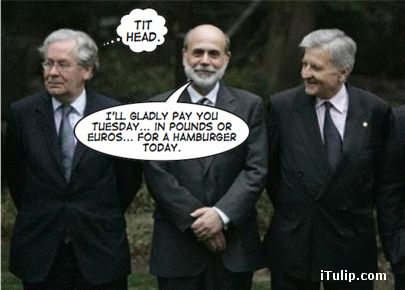 |
As I mentioned in Politics of Foreign Debt: Why the government had to bail out the GSEs, the Treasury has set an important precedent. This comes on top of several that the Fed has also made, such as by extending to investment banks lending facilities that are only authorized by its charter to support commercial banks. Mayer asserts that the Treasury's new powers are unconstitutional, and I have not found any evidence to contradict this claim.
This, of course, knocks one of legs out of the three legged stool of the deflationist's argument, that the "rules of the game" do not allow the Federal Reserve and Treasury Department to take the steps needed to prevent widespread bank and financial firm failures.
There are, for all practical purposes, no rules.
That leaves only one's imagination as the limit to what the Fed and Treasury may do to support foreign creditors, or domestic ones, for that matter. I mentioned before, half joking, the possibility of the formation of a VisaMac GSE to create a secondary market for credit card loans if defaults get so high that Citi and other issuers get into serious trouble.
How about central banks allowing collateral, of "high quality" of course, denominated in each other's ungrounded, floating exchange rate currencies to keep the system going?
Top central banks eye foreign currency collateral
August 28, 2008 (Reuters - Krista Hughes)
Major central banks are working on new rules to bolster global liquidity flows in times of crisis by accepting assets denominated in foreign currencies, a Group of Ten central banking source said on Thursday.
They aim to address calls made more than two years ago for them to cooperate more -- a recommendation that was issued again in a Financial Stability Forum (FSF) forum report in April.
Under the changes, commercial banks could be allowed to use euro-denominated collateral to borrow dollars from the U.S. Federal Reserve and submit dollar-denominated assets as guarantees for European Central Bank liquidity operations.
"The assets would have to be of high quality," the G10 source said. "No firm decision has yet been taken."
AntiSpin: Whose definition of "high quality assets" are we using?August 28, 2008 (Reuters - Krista Hughes)
Major central banks are working on new rules to bolster global liquidity flows in times of crisis by accepting assets denominated in foreign currencies, a Group of Ten central banking source said on Thursday.
They aim to address calls made more than two years ago for them to cooperate more -- a recommendation that was issued again in a Financial Stability Forum (FSF) forum report in April.
Under the changes, commercial banks could be allowed to use euro-denominated collateral to borrow dollars from the U.S. Federal Reserve and submit dollar-denominated assets as guarantees for European Central Bank liquidity operations.
"The assets would have to be of high quality," the G10 source said. "No firm decision has yet been taken."
Wimp
Etymology
Contraction of "whimper", a sound a wimp might make. The term is rumored to have come from "Wimps", a group of French Roma who were kicked out of France, then moved to England and were kicked out again, then moved to the United States. The term was understood in the United States by the 1930s, as it was incorporated into the names of two famous media characters known for living up to that name: The devious but cowardly Popeye supporting character called "J. Wellington Wimpy", and the soft-spoken character "Wallace Wimple" from the radio show Fibber McGee and Molly.
Call it the the "Wimpy Fed Regime."Etymology
Contraction of "whimper", a sound a wimp might make. The term is rumored to have come from "Wimps", a group of French Roma who were kicked out of France, then moved to England and were kicked out again, then moved to the United States. The term was understood in the United States by the 1930s, as it was incorporated into the names of two famous media characters known for living up to that name: The devious but cowardly Popeye supporting character called "J. Wellington Wimpy", and the soft-spoken character "Wallace Wimple" from the radio show Fibber McGee and Molly.
iTulip Select: The Investment Thesis for the Next Cycle™
__________________________________________________
To receive the iTulip Newsletter and iTulip Alerts, Join our FREE Email Mailing List
Copyright © iTulip, Inc. 1998 - 2007 All Rights Reserved
All information provided "as is" for informational purposes only, not intended for trading purposes or advice. Nothing appearing on this website should be considered a recommendation to buy or to sell any security or related financial instrument. iTulip, Inc. is not liable for any informational errors, incompleteness, or delays, or for any actions taken in reliance on information contained herein. Full Disclaimer
__________________________________________________
To receive the iTulip Newsletter and iTulip Alerts, Join our FREE Email Mailing List
Copyright © iTulip, Inc. 1998 - 2007 All Rights Reserved
All information provided "as is" for informational purposes only, not intended for trading purposes or advice. Nothing appearing on this website should be considered a recommendation to buy or to sell any security or related financial instrument. iTulip, Inc. is not liable for any informational errors, incompleteness, or delays, or for any actions taken in reliance on information contained herein. Full Disclaimer

Comment